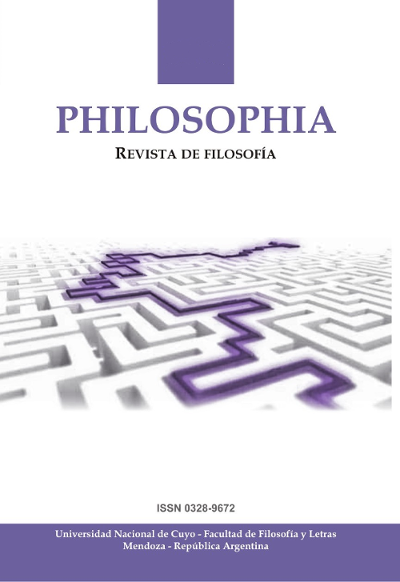Second-Person Perspective and Rationality in moral decisions. Scientific Evidence and the limites of Emotivism
DOI:
https://doi.org/10.48162/rev.50.007Keywords:
Moral emotivism, Second-person perspective, Ethical Rationality, Cognitive ScienceAbstract
The article examines moral emotivism following two lines of argument. The first one considers its alleged support by the results of the cognitive sciences, showing that opposite interpretations of the same evidence are possible. The second one explores the second-person perspective in our ethical decisions. From the analysis we can conclude the fundamental importance of rationality both for the recognition of the other person and for the formation of the ethical judgement. The paper concludes that, even though emotions are necessary, they are not sufficient for the formation of an ethical judgement, underlining that rationality is needed.
References
Asla, Mariano. La Gramática Moral Universal: ¿Una aproximación cognitivista a la ley natural? Pamplona: Eunsa, 2016.
Ayer, Alfred Jules. Language, Truth, and Logic. New York: Dover Publications, 1936.
Bennett, Max R. y Hacker, Peter M. S. Philosophical Foundations of Neuroscience. Oxford: Blackwell Publishing, 2003.
Carrasco, M. Alejandra. “Sentimientos morales y educación afectiva. El dilema de un bombero”. En Manual de Ética Aplicada: de la Teoría a la Práctica, eds. L. Valera y M. A. Carrasco, 107-118. Santiago: Ediciones UC, 2021.
Chapman, H. A., Kim, D. A., Susskind, J. M. y Anderson, A. K. “In bad taste: Evidence for the oral origins of moral disgusts”, Science, 323 (2009): 1222-1226.
Chrisman, Matthew, “Emotivism”. En The International Encyclopedia of Ethics, ed. H. LaFollette, 1600-1606. Malden: Wiley-Blackwell, 2013.
Damasio, Antonio. El error de Descartes. Barcelona: Planeta, 2018.
Darwall, Stephen. The second-person standpoint: morality, respect, and accountability. Cambridge, MA: Harvard University Press, 2006.
Darwall, Stephen. “Bipolar obligation”. En Oxford Studies in Metaethics, Volume 7, ed. R. Shafer-Landau, 334-358. Oxford: Oxford University Press, 2012.
Darwin, Charles. The Descent of man and Selection in Relation to Sex [1871]. En Great Books of the Western World, eds. R. M. Hutchins y W. Benton. Chicago: Encyclopedia Britannica, 1980.
De Caro, Mario. “Is moral emotivism supported by evolutionary psychology?”. En Moral Behavior and free will: a neurobiological and philosophical approach, eds. J. J. Sanguinetti, A. Acerbi y J. A. Lombo, 111-124. Roma: IF Press, 2010.
Doris, John, Stephen Stich, Jonathan Phillips y Lachlan Walmsley. “Moral Psychology: Empirical Approaches”. En The Stanford Encyclopedia of Philosophy, ed. E. N. Zalta (2020). URL = https://plato.stanford.edu/archives/spr2020/entries/moral-psych-emp/
FitzPatrick, William. “Morality and Evolutionary Biology”. En The Stanford Encyclopedia of Philosophy, ed. E. N. Zalta (2021). URL = https://plato.stanford.edu/archives/spr2021/entries/morality-biology/
García-Huidobro, Joaquín. El anillo de Giges. Madrid: Rialp, 2013.
Greene, Joshua D. “From neural ‘is’ to moral ‘ought’: what are the moral implications of neuroscientific moral psychology”, Nature Review Neuroscience, 4 (2003): 847-850.
Greene, Joshua D. “The secret joke of Kant’s soul”. En Moral psychology: The neuroscience of morality: Emotion, Brain Disorders, and Development, Volume 3, ed. W. Sinnott-Armstrong, 35-79. Cambridge: The MIT Press, 2008.
Haidt, Jonathan. “The emotional dog and its rational tail: a social intuitionist approach to moral judgement”, Psychological Review, 108 (2001): 814-834.
Hume, David. Tratado de la naturaleza humana. Madrid: Tecnos, 2005.
Knuuttila, Tarja. “Modelling and representing: an artefactual approach to model-based representation”, Studies in History and Philosophy of Science, 42 (2011): 262-271.
Ladyman, James. Understanding Philosophy of Science. Oxford: Routledge, 2002.
Lavin, Douglas. “Other wills: the second person perspective in ethics”, Philosophical Explorations, 17 (2014): 279-288.
Pauen, Michael. “The second-person perspective”, Inquiry, 55 (2012): 33-49.
Popper, Karl R. La lógica de la investigación científica. Madrid: Tecnos, 2017.
Ridge, Michael. “Non-cognitivism”. En The International Encyclopedia of Ethics, ed. H. LaFollette, 3610-3625. Malden: Wiley-Blackwell, 2013.
Sanguineti, Juan José. Neurociencia y filosofía del hombre. Madrid: Ediciones Palabra, 2014.
van Roojen, Mark. “Moral Cognitivism vs. Non-Cognitivism”. En The Stanford Encyclopedia of Philosophy, ed. E. N. Zalta (2018). URL = https://plato.stanford.edu/archives/fall2018/entries/moral-cognitivism/
Zahavi, Dan. Subjectivity and Selfhood. Cambridge, MA: The MIT Press, 2005.
Published
How to Cite
Issue
Section
License
Copyright (c) 2021 Philosophia

This work is licensed under a Creative Commons Attribution-NonCommercial-ShareAlike 3.0 Unported License.
Se permite la reproducción de los artículos siempre y cuando se cite la fuente. This work is protected under license Attribution-NonCommercial-ShareAlike 3.0 Unported (CC BY-NC-SA 3.0) You are free to: Share "” copy and redistribute the material in any medium or format; Adapt "” remix, transform, and build upon the material
The licensor cannot revoke these freedoms as long as you follow the license terms.
Under the following terms:
Attribution "” You must give appropriate credit, provide a link to the license, and indicate if changes were made. You may do so in any reasonable manner, but not in any way that suggests the licensor endorses you or your use.
NonCommercial "” You may not use the material for commercial purposes.
ShareAlike "” If you remix, transform, or build upon the material, you must distribute your contributions under the same license as the original.
No additional restrictions "” You may not apply legal terms or technological measures that legally restrict others from doing anything the license permits.
For more information, please visit: https://creativecommons.org/licenses/by-nc-sa/3.0/deed.en















